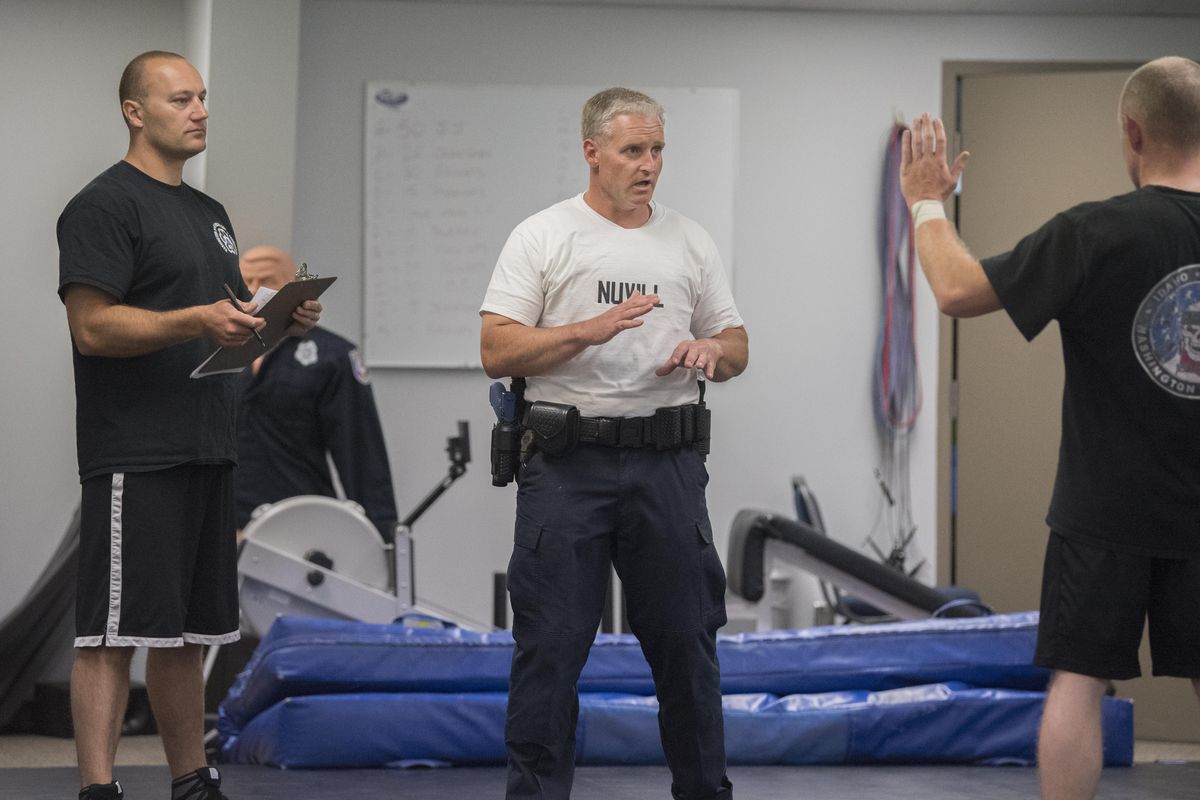Four training at academy talk of motivation

Here are the thoughts of four candidates who were training in June at the Spokane Police Academy to become law enforcement officers:
Joe Dunsmoor, 40
Dunsmoor worked in the Spokane County Jail as a corrections officer for 11 years and decided he didn’t want that to be his last job.
“You see a lot in the jail,” said Dunsmoor, who was training to become a Spokane police officer. “I didn’t want to spend another 20 years there, but I feel like it gives me a leg up on everyone else.”
He has 12 years experience with the National Guard and a master’s degree in organizational leadership.
Dunsmoor was initially a little apprehensive about going into law enforcement, but his wife encouraged him.
“She’s been very supportive,” Dunsmoor said.
He said violent videos of officer-involved shootings shared on social media change the public’s perception of law enforcement.
“If you consider going into law enforcement, it should worry you what people share on social media,” Dunsmoor said.
But his friends have been supportive, and no one has questioned his decision.
“If you want Spokane to be a better place, then why not sign up?” Dunsmoor said. “Why wouldn’t you want to do something to help the community?”
Brent Armstrong, 27
After high school, Armstrong held down a variety of jobs, including working at a glass plant and at a car dealer.
“I was kind of a jack-of-all-trades,” Armstrong said. “I grew up in a small place. I knew I had bigger aspirations. I just didn’t know what for.”
He grew up in Mossyrock, Washington, and went to Centralia (Washington) College where he got a technical degree in criminal justice, still uncertain what he wanted to do. It was one of his professors who encouraged him to take a serious look at law enforcement. He moved to Spokane two years ago.
Armstrong, who was at the Spokane Police Academy training to become a Spokane police officer, said public perception of law enforcement has become more negative.
“There’s more negative scrutiny out there, and the media kind of downplays it,” Armstrong said. “But you can’t let (the negativity) affect you.”
The potential dangers of the job are outweighed by the benefits, Armstrong said.
“I have a lot of avenues for where to take my career right now. I’m not sure what I will focus on,” Armstrong said. “Plus there’s the great pay and benefits. It’s a good job.”
Logan Henry, 34
Henry arrived at the Spokane Police Academy to train to become a sheriff’s deputy after working for a federal agency he preferred not to name. It wasn’t the job, but rather traveling all the time got old, he said, and he began looking for his next career.
“The training at the academy has been a nice refresher on a lot of things,” Henry said. “But the biggest bonus is that I get to go home every night.”
Henry, who moved to Spokane from Denver six years ago, said there was no question in his mind that law enforcement was what he wanted to do.
“I do think the perception of law enforcement officers has become more negative. Officers have become targets,” Henry said. “So you have to be more careful when you are out there.”
He added that many people don’t understand how difficult the training is. Henry joked that the training is taking its toll after almost 12 months.
“I’m impressed with the other recruits here,” Henry said. “You have to have integrity, be honest and be very strong both physically and mentally.”
Ryan Nuvill, 41
Nuvill grew up in Michigan where he retired after 22 years in the Marine Corps and seven deployments overseas. A road trip with his wife took him through the Inland Northwest and they decided to move here.
He was training at the academy to become a sheriff’s deputy.
Nuvill said the move from military to law enforcement felt like a natural progression, without the hostility he encountered on his military tours.
“It’s very different skills that you use here at home,” Nuvill said. “Law enforcement is not so hostile; the situations usually are not as hostile as what you encounter as military.”
Nuvill said he missed the camaraderie from the Marines and was surprised and delighted when he found that again with the recruits.
“I also like that law enforcement has more leeway as to how we do our jobs than the military does,” Nuvill said.
Compared to his extensive military service, law enforcement does not seem more dangerous, and he likes the focus on community involvement.
“The guys here live where they work and they have a vested interest in making their community better,” Nuvill said.
The negative social media portrayal of law enforcement doesn’t bother him, though he recognizes it as something to be aware of.
“I see this kind of work as hugely rewarding,” Nuvill said. “Social media will not take away from that.”